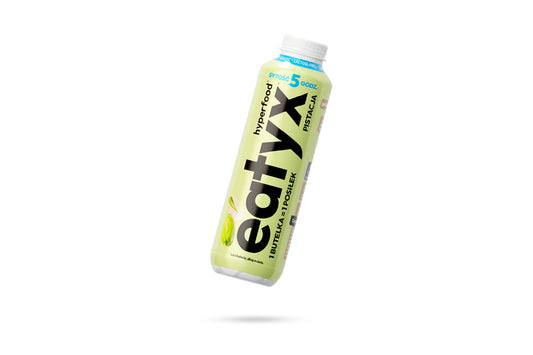Protein, carbohydrates and fats - every meal is built on these three macronutrients. Today we will take a closer look at the first of them: the one without which life is simply impossible. What is the role of protein in the body and which products are its best sources? Why should we avoid its deficiency (and excess)? We answer!
Proteins – what are they really?
It can be said that the life of every organism begins with proteins. They are the basic building blocks of all cells, even the smallest ones, that make up our bodies. It is thanks to proteins that we grow and develop, heal wounds and absorb oxygen - no matter how much vitamins or minerals we provide our body with, without protein they will have no meaning for us!
The proteins themselves (or proteins) consist of single amino acids connected by peptide bonds. Depending on how the human body deals with their synthesis, amino acids are divided into:
- exogenous - i.e. those that we must supply "from the outside" because we are unable to synthesize them ourselves; these include, among others: histidine, leucine, methionine and phenylalanine;
- endogenous - that is, those that our body is able to synthesize on its own in an amount that meets all the demand (this applies to, for example, asparagine or glutamic acid) or part of it (the deficiency must be supplemented with a balanced diet - this is the case, among others, of glutamine and glycine).
What's probably most interesting is that the human body does not directly absorb proteins contained in food because... it is unable to do so. How do we solve this problem? By breaking down protein in the body into individual amino acids and then synthesizing them in cells again into proteins. Complicated, right?
Another characteristic of proteins is the fact that almost each of them is different - more specifically, it has a different amino acid composition. In nutritional biotechnology, we talk about the so-called a reference protein, i.e. one that contains all the amino acids necessary for humans in optimal proportions. Depending on how close to the "ideal" protein is contained in a given product, we distinguish complete proteins (found in meat, fish and dairy products) and incomplete proteins (found in cereals, nuts and legumes).
Functions of proteins in the body
As we said, proteins are the basis of our (and not only!) life. They create the structure of cells and are responsible for their proper functioning; they participate in every stage of their formation and growth. This is why protein intake is so important for children and adolescents - development requires protein!
Adults need slightly less protein every day, but this does not mean that they need little of it. After all, proteins are responsible for, among others: for the synthesis of hormones (on which our proper functioning depends!), they mediate the transport of oxygen and genetic information between cells and are the basic component of antibodies (and therefore the immune system). They also have a regulatory function, helping to maintain the body's water and acid-base balance. And do we need to add that they are necessary for healing wounds and rebuilding damaged organs? The health-promoting properties of proteins are simply countless!
Properties of proteins – what are the effects of their deficiency…
What will happen if there is no protein in our diet? The following will indicate that it is probably worth changing something in your diet:
- brittle and brittle hair;
- increased appetite for sweet snacks;
- muscle and joint pain;
- problems with concentration and memory;
- feeling of general weakness of the body.
A persistent protein deficiency in the body may contribute to much more serious problems - however, we would be talking about diseases related to malnutrition rather than an improperly balanced diet. If you observe the above symptoms, and after a short "analysis" of your eating habits, you find that your diet lacks high-value sources of protein - it's time for something new. For example, for quick cold dishes from eatyx - ready to provide you with the necessary dose of proteins and other nutrients at any time! And if you have a little more time for yourself (but not enough to prepare a traditional meal) - quick hot dishes will help fill the gaps in your daily menu!
What are the effects of excess protein?
As with everything, you can also overdo it "the other way" with proteins. The use of proteins in our diet usually involves consuming significant amounts of high-fat animal products. A meat-dominated diet will certainly provide a lot of invaluable building material, but at the same time it may pose a risk of developing overweight, hypertension or atherosclerosis. Protein itself can also be a burden on the body; especially for the kidneys and liver, which may not be able to keep up with its absorption. So let's control the amount of protein consumed - for example, by including quick ready-made meals in our diet
eatyx with protein content adapted to everyday needs!
How to meet your protein needs?
Probably each of us associates proteins primarily with meat (or eggs!). And no wonder - animal products are considered the best source of proteins. Present in:
- meat (various types - not only chicken!);
- fish;
- milk and its products;
- chicken eggs,
proteins have a high biological value - they contain basically all amino acids that the human body would not be able to produce on its own, and their structure is most similar to the proteins that make up our cells.
Plant products can also be a good source of amino acids - although the proteins they contain are slightly more difficult for the body to absorb due to the presence of fiber. Vegetable proteins are found primarily in legume seeds (soybeans, beans and peas), cereal products (groats, flakes and flour) and nuts; some fruits and… potatoes will also provide a dose of amino acids.
Of course, getting amino acids from only one source is not a good idea (even if it is a complete source!). Optimal protein absorption is only possible with a varied diet, combining products with different contents of other micro- and macronutrients. You can use the eatyx dietary supplement tailored to your needs and eating habits:
- eatyx HYPER DETOX 360 – for those who want to cleanse their body and improve metabolism;
- eatyx HYPER VITAMINS AND MINERALS + PROBIOTICS - for those who need an additional dose of vitamins and minerals and also want to support the immune system;
eatyx HYPER BRAIN IQ BOOSTER – for those who could use an energy boost.



